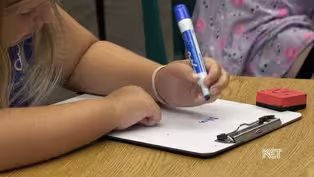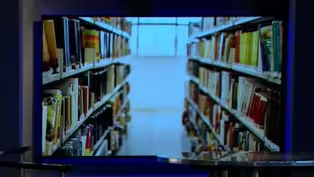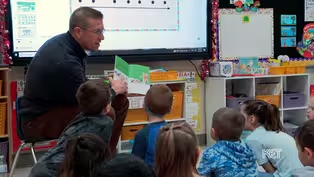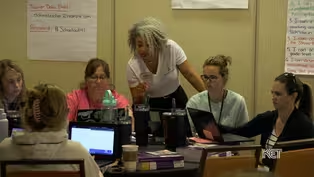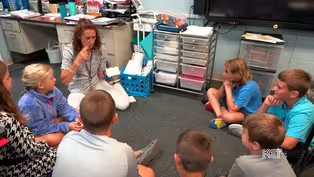
Kentucky’s Literacy Curriculum Requirements
Clip: Season 2 Episode 127 | 6m 43sVideo has Closed Captions
Legislation passed last year requires all Kentucky school districts to adopt literacy ...
Legislation passed last year requires all Kentucky school districts to adopt literacy curriculum that aligns with what's called "the science of reading."
Problems playing video? | Closed Captioning Feedback
Problems playing video? | Closed Captioning Feedback
Kentucky Edition is a local public television program presented by KET

Kentucky’s Literacy Curriculum Requirements
Clip: Season 2 Episode 127 | 6m 43sVideo has Closed Captions
Legislation passed last year requires all Kentucky school districts to adopt literacy curriculum that aligns with what's called "the science of reading."
Problems playing video? | Closed Captioning Feedback
How to Watch Kentucky Edition
Kentucky Edition is available to stream on pbs.org and the free PBS App, available on iPhone, Apple TV, Android TV, Android smartphones, Amazon Fire TV, Amazon Fire Tablet, Roku, Samsung Smart TV, and Vizio.
Providing Support for PBS.org
Learn Moreabout PBS online sponsorshipLegislation passed last year requires all Kentucky school districts to adopt literacy curriculum that aligns with what's called the science of reading.
It's a phonics based approach to reading.
Now, in August, Katie hosted a forum on early literacy featuring a panel of experts who discussed the science of reading.
The impact it's having and why it's important for children to receive targeted interventions as early as possible.
That phrase the science of reading, refers to a robust body of data that we have now from decades of really good research from multiple fields of science.
So it's not just research of classroom practices, but brain scans and neurology and other aspects of study to see what is happening when a brain learns to read.
And why does it seem to happen more effortlessly for some, and then with great struggle for others?
And it has really clarified for us what reading really is in the brain and has clarified for us what practices are better and work better and which practices really don't help someone learn to read.
So it's clarified for us, for the general public, what are best practices and then has really helped us in the area of reading disabilities to determine what really is the breakdown.
What is the roadblock and how do we get past that?
So it's really about making those brain connections and now we know the science behind it.
Yes, we've learned so much more than we once did, of course, and a lot of what we thought we knew turned out to be myth.
And so now we know and teachers are familiar now with terms like phonemic awareness.
That wasn't in our vocabulary a few decades ago.
And now we realize that really, in order to teach phonics or decoding, there's got to be that component of education called phonemic awareness, which literally builds neurology in the temporal lobe to dissect oral words into sounds.
So let's talk about exactly what that means when it comes to teaching.
So I'll go to you, Lindsay.
You've been teaching the skills based literacy in your first grade classes for about three years now, and your school, Chancy, was a pilot program for this shift in Jefferson County.
So before you were teaching what was called a balanced literacy approach.
Explain how you teach reading in these two different ways.
Okay.
So before we would have our reading block and we would read a fiction story and we would focus on it maybe a week and it would be a graphic organizer with this story.
And then maybe we would do a craft with it.
But it was very surface level.
We never dug deep.
Now we use the curriculum, our curriculum to base our instruction, and we go very deep into the text.
We study a topic, we study attacks, and we go into the vocabulary of it in like our small group reading areas.
In the past, we would have a guided reading card that would give us comprehension questions and a text to go with it and maybe a one minute thing on work, work on phonics, and you would have a leveled reader to go with it.
And so the kids would not have time or would not have the access to practice that skill.
And so now when we're doing our reading, we do a skill, so we'll learn a skill and we will be able to assess kids on that skill.
And our groups are no longer a level that's proven that those have not been effective.
In fact, they widen the gap for children.
And so now I can pull kids on a specific skill that they're lacking.
So maybe they're struggling with a certain vowel team.
I pull the kids that are struggling with that vowel team and we hit it hard and then they continue on.
And then the next week it might be a different group that has a different struggle.
And you can just see so much more growth because the kids are getting such intentional instruction, they are able to decode the words.
They have strategies now instead of just look at the picture.
And what do you think might happen?
What would that word be?
If you look at that picture and now we are not doing that.
They are learning the skills to decode a word.
So the problem is, though, that some brains are going to make those connections no matter what.
And then we saw, like with Miles instance, and some need that more explicit instruction.
So, Phil, explain what that means for children and parents, how it can easily lead to struggles in other areas beyond this.
Right.
One thing I would want to point out is that when we're talking about students who need explicit instruction in the code of language, we're not talking just about students with dyslexia.
We're actually talking about the majority of children, about 60% of children need some explicit instruction because, as you said, it's not a natural thing for the brain to be doing for those 40% who learn to read with very little effort, they still benefit from that code based instruction.
They're there reading and spelling skills do improve with that.
So I want to kind of clarify that for everyone.
But what it means for someone who needs that explicit instruction in decoding, if they don't get that reading is a mystery to them.
They think it's a sort of magic that other kids can do and they can't, and their experience leads to their their connection with reading, their emotional connection.
If it's difficult and they're not successful, they don't enjoy it and so they avoid it.
And that avoidance, of course, means they're not practicing to get better while their peers who are good readers love it and read as much as they can.
So they're setting they're being set up by the system to avoid something that they desperately need and to not get the type of instruction they need.
Parents, meanwhile, are being told some of the myths that we've learned from from the research are things like, well, your child will catch on just a little bit later.
And the research is very clear that that significant deficits at the beginning of the of the curve, they don't improve on their own.
They need an intervention.
So their it turns into a waiting game.
And what point is my child far enough behind that they finally will get the instruction they need.
And sometimes that comes at too late an age to really take advantage of how neuroplasticity the brain is.
At that young age, it's easier to do intervention early.
One Student’s Path to Better Reading
Video has Closed Captions
Clip: S2 Ep127 | 4m 1s | The 2023 Kentucky School Report Card and a recent report by the National Assessment of ... (4m 1s)
Video has Closed Captions
Clip: S2 Ep127 | 3m 11s | When the General Assembly passed the Read to Succeed Act last year, this phonics-based ... (3m 11s)
Video has Closed Captions
Clip: S2 Ep127 | 4m 9s | "Real Men Read,” a United Way literacy initiative in Somerset, enlists role models who ... (4m 9s)
Teachers Learning to Teach Reading
Video has Closed Captions
Clip: S2 Ep127 | 2m 36s | Before the start of the school year, almost 3,000 Jefferson County teachers were ... (2m 36s)
“The Science of Reading” in Action
Video has Closed Captions
Clip: S2 Ep127 | 4m 44s | Hancock County has been teaching “the science of reading” for some time, allowing us to... (4m 44s)
Providing Support for PBS.org
Learn Moreabout PBS online sponsorship
- News and Public Affairs

Top journalists deliver compelling original analysis of the hour's headlines.

- News and Public Affairs

FRONTLINE is investigative journalism that questions, explains and changes our world.












Support for PBS provided by:
Kentucky Edition is a local public television program presented by KET
